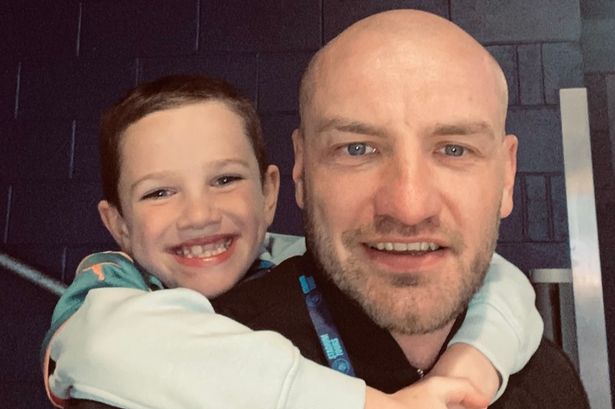Daniel Morrison, a 39-year-old father from Cambuslang, Lanarkshire, is sharing his story to highlight the importance of early cancer detection. In the summer of 2022, he noticed unusual symptoms, including fluid bubbles under his tongue, nausea, and severe fatigue. Recognizing that something was wrong, he promptly booked an appointment with his dentist.
During his visit, tests revealed a small lump in his neck. Initially, doctors reassured him that it might be a minor issue, possibly related to his salivary gland. However, after further examinations, they identified two tumours: one benign and the other malignant. The benign tumour had concealed the presence of the more serious salivary gland cancer.
“Getting everything checked early was vital to giving me the best chance for this all to be discovered and treated,” Morrison stated. The timely diagnosis provided him with a fighting chance against the disease.
In April 2023, Morrison underwent extensive surgery, lasting approximately 19 hours over two days. He praised the medical teams at the Glasgow Dental Hospital for their efficiency and professionalism throughout the ordeal. “I’m so thankful as I’m a young dad with young children who need me,” he reflected.
Now in recovery, Morrison has adopted a renewed perspective on life. He has made a conscious effort to spend quality time with his children, engaging in activities such as playing football, dancing, and drawing. “I’m definitely more appreciative of the time we spend together,” he remarked.
Morrison is not only focused on his recovery but is also committed to raising awareness about the importance of early detection. He spoke to medical students at the Glasgow Dental Hospital, emphasizing how even minor symptoms can have significant implications. “A big part of our conversation was about how important early detection is,” he explained. “Spotting signs—no matter how small—can greatly increase the chances for individuals and their loved ones to live well again.”
He urges anyone experiencing unusual symptoms not to ignore them. “In my case, fatigue and feelings of nausea were key signs,” he said. Symptoms to watch for include a persistent cough lasting more than three weeks, unexplained bleeding, unusual lumps, unexplained weight loss, or any other persistent changes that feel abnormal.
Research consistently shows that early detection is one of the most effective tools in improving cancer survival rates. Patients diagnosed at earlier stages often have better prospects for curative treatment and long-term survival. “Please don’t delay—contact your local GP and visit getcheckedearly.org to learn more,” Morrison advised as he looks forward to a bright future with his family.
His story serves as a powerful reminder of the critical role that awareness and prompt medical attention play in combating cancer.







